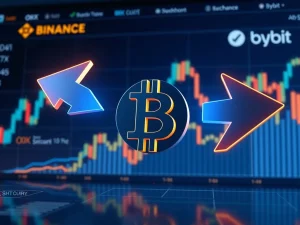Unveiling the Peril: Prometheum CEO Warns Tokenization Risks Gambling in Crypto Compliance Debate

The world of digital assets is constantly evolving, pushing the boundaries of traditional finance. Yet, as innovation accelerates, so too do the calls for clarity and robust regulation. At the heart of this intense debate is the concept of tokenization, and a recent, powerful warning from Prometheum’s co-CEO, Aaron Kaplan, has sent ripples through the industry. Kaplan suggests that without proper underlying rights, some forms of tokenization risks becoming nothing more than speculative gambling, akin to the volatile world of meme coins. This perspective underscores a critical tension: how do we foster groundbreaking financial technology while safeguarding investors and maintaining market integrity?
Unpacking the Prometheum CEO’s Stance: Are Tokenization Risks Being Underestimated?
Aaron Kaplan, a prominent figure leading Prometheum, has articulated a sharp distinction that resonates deeply within the digital asset community. His core argument is simple yet profound: if a token, purporting to represent a real-world asset like a stock, doesn’t grant its holder any meaningful rights to that underlying asset, then its utility shifts from investment to mere speculation. “When a company issues a token representing a real-world asset, such as a stock, but it doesn’t have any right to the underlying, what you’re really doing is moving towards a gambling mindset,” Kaplan stated in an interview. This perspective highlights significant tokenization risks, particularly for retail investors who might be drawn to the allure of digital assets without fully understanding the underlying mechanics or lack of inherent value.
Kaplan’s critique is a direct challenge to certain tokenized offerings that, in his view, erode investment integrity by mimicking the unpredictable dynamics of meme coins. He believes such practices undermine the legitimate potential of blockchain technology to revolutionize financial markets. For Prometheum, the emphasis is firmly on creating a compliant and secure environment for digital asset securities, moving away from the speculative “wild west” often associated with parts of the crypto market.
Navigating Digital Asset Regulation: Prometheum’s Path to Compliant On-Chain Securities
Prometheum is not just an observer in this regulatory landscape; it aims to be a key player. The firm is strategically positioning itself as a licensed custodian and facilitator for on-chain securities, a move that aligns with the growing push to integrate blockchain into traditional financial infrastructure. Kaplan emphasized Prometheum’s unique ability to manage the “entire lifecycle of a digital asset” through its licensed subsidiaries, which include a special-purpose broker-dealer and an alternative trading system (ATS).
This approach is crucial in the evolving dialogue around digital asset regulation in the U.S. While the firm currently safeguards a limited number of tokens, its expansion into supporting a broader range of on-chain securities signifies a commitment to operating within established regulatory frameworks. Prometheum’s strategy directly addresses the challenges of crypto compliance, seeking to provide a regulated pathway for issuers and investors alike, thereby mitigating many of the inherent tokenization risks that Kaplan warns against.
The Broader Landscape of Crypto Compliance: Industry Voices and Regulatory Calls
Kaplan’s “meme-coin-ification” critique echoes concerns voiced by various regulators and market participants. The Securities and Exchange Commission (SEC), especially under a crypto-friendly administration following the 2024 election, faces mounting pressure to clarify its stance on tokenized assets. The industry craves certainty, and the lack thereof creates an environment ripe for regulatory arbitrage.
Key industry players are actively engaging in this debate:
- Citadel Securities: Urged the SEC to treat tokenized equities similarly to their traditional counterparts, cautioning against “self-serving requests for broad exemptions” that could exploit regulatory loopholes.
- SEC Commissioner Hester Peirce: Often dubbed “Crypto Mom,” she has consistently reiterated that tokenization does not exempt offerings from existing rules, advising firms to proactively engage with regulators rather than seeking to bypass them.
- Securitize’s CEO Carlos Domingo: Argues that only “native” tokenization – where assets are issued directly on a blockchain – is truly legitimate. Kaplan generally agrees but stresses the paramount importance of crypto compliance, noting that some companies misuse tokenization as a shortcut to bypass regulations. “It might be a derivative, but it’s a security, and therefore it still has to follow the rules,” he asserted.
This dynamic interplay between innovation and regulation is further evidenced by market activity. Kraken’s launch of xStocks on Solana and Robinhood’s introduction of “stock tokens” on Arbitrum (clarified as indirect exposure via contracts) underscore the immense potential and inherent tokenization risks as firms navigate uncharted regulatory territory. The industry is actively experimenting, pushing boundaries, and awaiting clearer guidance on digital asset regulation.
What’s Next for On-Chain Securities? Balancing Innovation with Accountability
The trajectory of the digital asset industry remains uncertain, but the momentum towards on-chain securities is undeniable. Kaplan’s controversial testimony before Congress in 2023, where he claimed the SEC had outlined a “clear path to compliance,” drew criticism from crypto advocates who argued the agency’s approach was inconsistent. His current strategy, however, focuses on leveraging Prometheum’s licensed infrastructure to support on-chain securities, aiming to align with evolving regulatory expectations and avoid the pitfalls of speculative projects.
While proponents like BlackRock’s Larry Fink envision tokenization as the “next generation of markets,” critics continue to warn of fragmentation and potential regulatory pushback. As firms like Prometheum and Citadel Securities advocate for clearer guidelines, the SEC’s role in defining the boundaries of tokenization will be critical. Prometheum CEO Aaron Kaplan’s warnings against conflating legitimate tokenization with gambling serve as a vital reminder that innovation must be meticulously balanced with accountability, particularly as this transformative market matures. The path forward demands collaboration, clear rules, and a shared commitment to investor protection.
Frequently Asked Questions (FAQs)
1. What does Prometheum CEO Aaron Kaplan mean by “tokenization risks gambling”?
Aaron Kaplan argues that when a token represents a real-world asset (like a stock) but doesn’t grant the holder any actual rights or ownership of that underlying asset, it becomes purely speculative. He likens this to gambling because the token’s value is not tied to tangible rights but rather to market sentiment and hype, similar to meme coins.
2. How is Prometheum positioning itself in the digital asset space?
Prometheum is positioning itself as a regulated custodian and facilitator for on-chain securities. Through its licensed subsidiaries, including a special-purpose broker-dealer and an alternative trading system (ATS), it aims to manage the entire lifecycle of digital assets in a compliant manner, providing a regulated pathway for tokenized securities.
3. What is the current stance of the SEC on tokenized assets?
The SEC’s stance is still evolving, but key figures like Commissioner Hester Peirce emphasize that tokenization does not exempt offerings from existing securities rules. The agency encourages firms to engage proactively with regulators to ensure crypto compliance, rather than seeking broad exemptions.
4. What is the difference between “native” tokenization and other forms?
“Native” tokenization, as described by Securitize’s CEO Carlos Domingo, refers to assets that are issued directly on a blockchain from their inception. This is often contrasted with tokenized representations of existing assets that may not grant direct underlying rights. Kaplan agrees with the principle of native tokenization but stresses that even derivatives or representations must adhere to existing securities regulations.
5. What are some examples of companies entering the tokenized asset space?
Companies like Kraken have launched xStocks on Solana, and Robinhood has introduced “stock tokens” on Arbitrum. While these initiatives show growing interest in tokenized assets, Robinhood clarified its offering represents indirect exposure via contracts, highlighting the varying approaches and regulatory considerations in the market.
6. Why is clear digital asset regulation important for the industry’s future?
Clear digital asset regulation is crucial for fostering investor confidence, preventing fraud, and enabling the mainstream adoption of blockchain technology in finance. Without clear rules, the market risks fragmentation, regulatory arbitrage, and a lack of accountability, hindering its potential for growth and stability.









